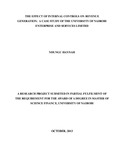| dc.contributor.author | Ndungu, Hannah | |
| dc.date.accessioned | 2013-11-21T06:59:11Z | |
| dc.date.available | 2013-11-21T06:59:11Z | |
| dc.date.issued | 2013-10 | |
| dc.identifier.citation | Master Of Science In Finance, University of Nairobi, 2013. | en |
| dc.identifier.uri | http://erepository.uonbi.ac.ke:8080/xmlui/handle/123456789/59684 | |
| dc.description.abstract | The study sought to evaluate the effect of internal controls on revenue generation in UNES. The research design that was employed in this study is descriptive design. The study population was all the employees at the UNES Limited during the calendar year 2013. Data was analyzed by use of the linear regression. The study found out that ICS contributes to revenue generation at the company. UNES play a number of roles in supporting the systems by ensuring all documents are authentic, correct and confirm that the relevant officers have signed all documents before processing to prevent misappropriation of revenues. The company has formalized policies and procedures for all activities which allows for good and efficient communication, control and monitoring of activities. All employees understand the concept and importance of internal controls, including the division of responsibility. Accounting records are limited to employees with designated responsibility for such records. The study revealed that UNES reviews its ICS when need arises. Numerous audits are conducted in line with technological changes to ensure the systems‟ sustainability. Long queues have been replaced by auto-receipting system that reduces time wasted on serving students. There were formalized policies and procedures for all major operations of the entity and policies. The Management is committed to the operation of the system and provides feedback to the officers about the operation of the system. Management has defined appropriate objectives for the entire organization and has criteria for ascertainment of which fraud - related risks to the organization are most critical.
The study recommends firms to cultivate integrity and ethical values among its employees and management. Effective board of directors, management, and internal audit departments should be established in organizations. Management should design internal controls to ensure efficiency and effectiveness, reliability of financial reporting as well as compliance with laws and regulations. Firms should adopt internal control and information systems that produce operational, financial and compliance-related information reports to make it possible to run and controls the business. Internal controls need to be adequately monitored in order to assess the quality and the effectiveness of the system‟s performance over time. Monitoring of customer feedback and audits should be conducted periodically by internal auditors. | en |
| dc.language.iso | en | en |
| dc.publisher | University of Nairobi | en |
| dc.title | The Effect of Internal controls on revenue Generation: A Case study of the University of Nairobi Enterprise and Services Limited | en |
| dc.type | Thesis | en |
| local.publisher | Department Of Finance And Accounting University Of Nairobi | en |

